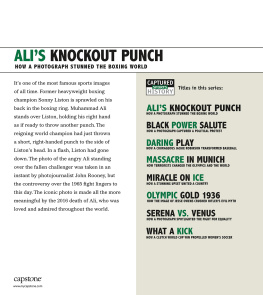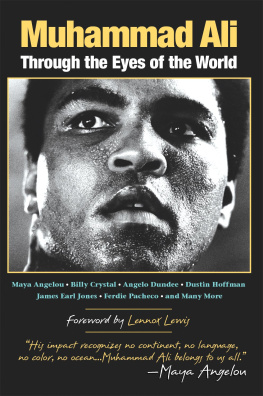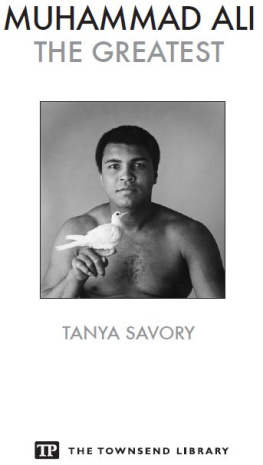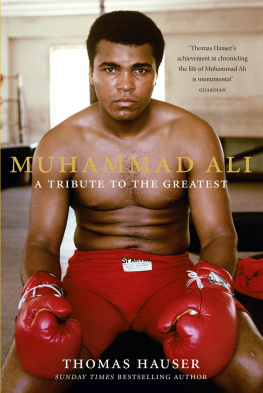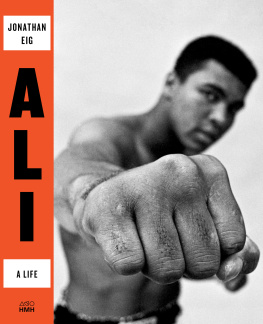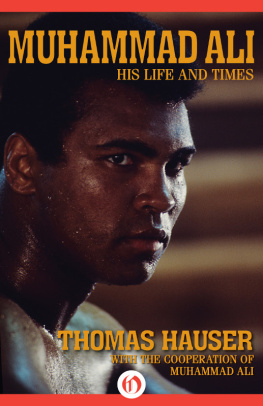ACKNOWLEDGMENTS
T HIS BOOK WOULD NOT HAVE BEEN possible without the support of numerous individuals who contributed their assistance, advice, and inspiration. Thanks first, of course, to Muhammad and Lonnie Ali; Thomas Hauser for his guidance and navigation; Phyllis Bailey; Damon and Dustin Bingham; my attorney, Ron DiNicola; BernieYumans; Mel Wallace; Daniel Sanger for his superb editing skills; Marc Baller and George de Kay of M. Evans & Co. for making the publication process a painless task; our agent Noah Lukeman, one of the best in the business, for persistence and patience; and the following people and institutions: Elizabeth Barthelet, Evan Beloff, Julian Bond, Jacquie Charlton, Esmond Choueke, Ramsey Clark, Ian Halperin, Coretta Scott King, Coretta Bather, Paul Bather, Stokely Carmichael (Kwame Toure), Ali Cohen, Gene Dibble, Harry Edwards, Julien Feldman, Jack Greenberg, Betty Hawkins, Jerry Izenberg, Jesse Jackson, Betty Johnston, Thomas Krattenmaker, Lyndon B. Johnson Presidential Library, Bob Lipsyte, Michael Meltsner, Larry Merchant, Charles Morgan Jr., NAACP Legal Defense Fund, James Nabrit III, David Nanasi, Brenda Plant, George Plimpton, Pat Putnam, Darcie Rowan, Betty Shabazz, Jonathan Shapiro, Tom Syvertsen, Wayne Smith, Mort Susman, Wallace Terry, Jack Todd Jamel Touati,, Margaret van Nooten, Robert Walker, Jeremiah Wall, Hope Wallace, Lloyd Wells, Bobby White, Sandy Wolofsky, Morag York, and Andrew Young.
AFTERWORD
The Legacy
T HROUGH THE AFRICAN NIGHT CAME the repeated cries, Ali Bomaye! Ali Bomaye! (Ali, kill him!). In the ring below, George Foremans supposedly indomitable punching power was being thwarted by Alis improvised rope-a-dope strategy, designed to exhaust the powerful champion.
In the weeks leading up to the fight, he had signalled a return of the old Ali, promising the skeptics he was in top form. I rassled an alligator, I done tassled with a whale/I handcuffed lightening/threw thunder in jail. Thats bad! Only last week, I murdered a rock, injured a stone/Im so mean, I make medicine sick!
Behind the tallyhoo, however, was an accute understanding of the significance of the fight and what it meant for so many.
Im going to win the fight for the prestige, he vowed, not for me but to uplift my brothers who are sleeping on concrete floors today in America, black people on welfare, black people who cant eat, black people who have no future. I want to win my title so I can walk down the alleys and talk to wineheads, the prostitutes, the dope addicts. I want to help my brothers in Louisville, Kentucky, in Cincinnati, Ohio, and here in Africa regain their dignity. Thats why I have to be a winner, thats why Ill beat George Foreman.
Hardly a pundit in Zaire that night in 1974 believed an aging Ali could overcome the overwhelming odds. But cunning triumphed over clout and in the eighth round Foreman went crashing to the canvas. Muhammad Ali had reclaimed the heavyweight championship, seven years and four months after it was stripped from him. It was a feat that his forbears Jack Johnson and Joe Louis were never able to accomplish.
But it was more than a boxing title he won that night. Suddenly, a nation that reviled him only a few years earlier signaled that all was forgiven. The first sign of the changing attitude came when Ring magazine bestowed on Ali the Fighter of the Year designation it had refused him in 1967 because he set a bad example for American youth.
Then, a little more than seven years after he received a letter from President Johnson ordering him to report for induction, Ali received a different kind of White House invitation. Gerald Ford beckoned the redeemed champion to the Oval Office in what was billed as a great gesture of reconciliation after the trauma of Vietnam and Watergate.
It was more likely a cynical Republican ploy to court black voters. Years later, Ford explained to Thomas Hauser why he issued the invitation. When I took office, we as a nation were pretty much torn apart. There were conflicts between families, in colleges, and on the streets. Wed gone through some serious race problems; the Vietnam War had heightened differences; and of course there was the heritage of Watergate. And one of the major challenges my administration faced was how we could heal the country. Not that everybody had to agree, but at least we should lower our voices and listen to one another and having Muhammad Ali come to the Oval Office was part of our overall effort and he was a man of principle. I know there were some who thought he evaded his military responsibility, but Ive never questioned anybodys dedication to whatever religion they believe in. I give people the maximum benefit of the doubt when they take a stand predicated on conscience. Thats always been my philosophy, so I never joined the critics who complained about what he did and didnt do during the Vietnam War. I accepted his decision.
Ford, who served in Congress during Alis exile period, may not have publicly joined the critics who denounced the champions induction refusal, but the record shows he never used his influential moral platform to support the boxers stand or praise him as a man of principle. In the years to come, many people would attempt to jump on the bandwagon of Alis growing popularity by retroactively supporting his stand. But despite their historical revisionism, at the time Ali desperately needed these peoples support, only a handful were there.
For Ali, a decade of pariah status had taken its toll and in his typically generous way he welcomed the new acceptance. But some of his supporters were not so forgiving.
When Ali came back from exile, recalled Jim Brown, he became the darling of America, which was good for America because it brought black and white together. But the Ali that America ended up loving was not the Ali I loved most. I didnt feel the same about him anymore, because the warrior I loved was gone. In a way, he became part of the establishment. And I suppose, in a sense, theres nothing wrong with that, because if you can come to a point where you make all people feel good, maybe thats greater than being a fighter for black people, but I didnt like it.
But Alis longtime defender, columnist Jerry Izenberg, has a different view of the boxers new social acceptability. It wasnt that Ali changed, he explains. He was the same as he always was. It was the rest of America that changed. The country went through Watergate and Vietnam and the turbulence of the 60s and it had a profound impact. Ali kept preaching the same message but now America could listen to it without going through convulsions.
Indeed, as the resurrected boxer continued to rack up victories in the ringincluding two magnificent triumphs over Joe Frazier to avenge his first defeatthe money rolled in and Ali vowed to use his earnings to fund his dream of black economic justice. But one thing hadnt changed.
After the Foreman fight, recalls Gene Dibble, there were millions of dollars pouring in, huge sums of money, more from one fight than Ali had made in his entire career. He was very excited about using the money in the ghettoes for community economic development to eliminate poverty. These lawyers took the money to invest and start a foundation in Chicago. Next thing you knew, the money was gone. It was the same old story.
When he wasnt being robbed blind by those around him, says Dibble, he was giving his money away. I remember one night I got a call from Ali, who was in New York. He had been watching the local news and he saw a report about this Jewish senior citizens community center in the Bronx which served Holocaust survivors. They were about to shut down because they owed $100,000. Ali had called them and said he was sending a check over to bail them out. Trouble is that, as usual, he didnt have two nickels to rub together. He wanted me to figure out where he was going to get the money he had promised them. I called a friend at the Chase Manhattan Bank and arranged a loan against Alis next fight purse. The center was saved.


